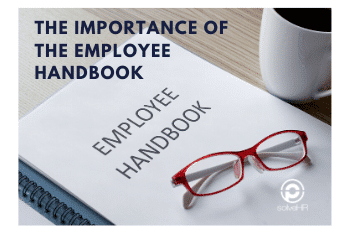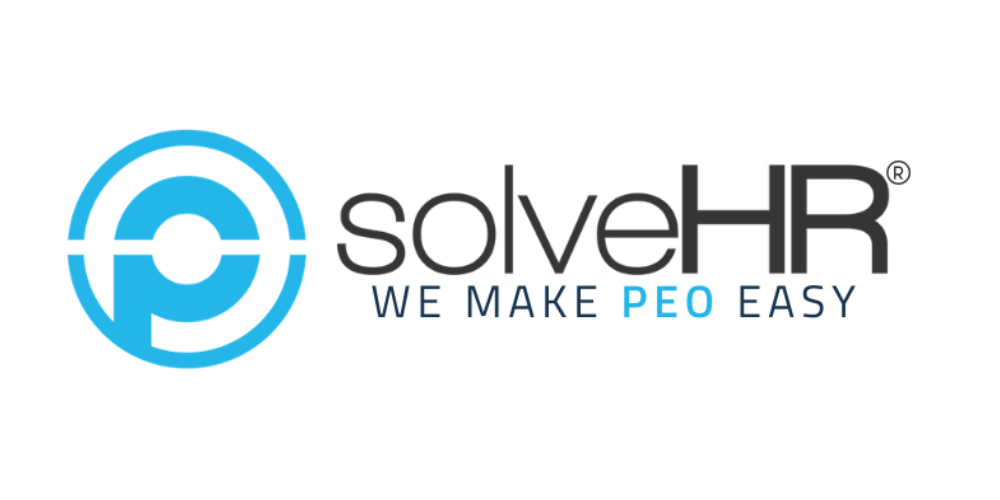- 05/12/2020
- Posted by: SolveHR-IT
- Categories: Culture & Retention, Risk & Compliance

An employee handbook can be a useful tool for communicating guidance and information related to your organization’s history, mission, values, policies, procedures, and benefits in a neat little book.
Creating an employee handbook from scratch can seem like a daunting task, but as we will illustrate in this post, you’ll begin to see that having an employee handbook is essential for having a transparent and consistent message across your organization.
Employee Handbooks
So, what is an employee handbook and what does it do? An employee handbook gives a detailed overview of your expectations from your employees and what your employees can expect from your company. By establishing your expectations in an employee handbook, you are clearly defining how employees should behave, policies that should be followed, and the benefits they should receive from working with the company.
Employee handbooks can also protect employers from employee lawsuits and claims, as a well-structured handbook can protect both the employee and employer as it establishes rules and structures for when situations arise.
Reasons to have an Employee Handbook
We’ve hinted at several reasons as to why you would want to put together an employee handbook, so we put together a few more reasons that your company could benefit from having one below:
- Establishes expectations for both the employees and employers and the consequence for violating these expectations.
- Saves time as it allows administrative teams to point towards the handbook for company rules and procedures instead of re-explaining for every employee.
- It provides a form of written onboarding for new employees and establishes the ins and outs of being an employee for your company.
- Serves as a guidebook for your Human resources team and a reference for your managers.
- It helps your business in outlining federal and state labor laws to employees and can also be a beneficial legal defense against an employee lawsuit.
- It allows your business to be transparent with your employees on its policies towards discrimination, harassment and also provides information for how they can report that type of behavior to management.
What should a good employee handbook contain?
You’re probably thinking of all the things that you could put into an employee handbook and maybe feeling a little overwhelmed at all the possible ideas. Don’t worry because below we’ve made a shortlist of some sample ideas that we thought would be perfect to include in a comprehensive handbook:
- Standards of conduct
- Work Schedules
- Anti-discrimination policies
- Non-disclosure agreements and conflict of interest statements
- Compensation
- Workplace safety and security
- Employee benefits
- Leave policies
- How to file complaints
Of course, your handbook should be unique to your business and the goals of your organization, but the above is just meant to spark some ideas on how you should structure it. Remember that your employee handbook should be straightforward and use simple language to be easily understood by your employees.
You should regularly update your employee handbook as laws change and your employee handbook can become an important tool in case of lawsuits. Try to avoid legal jargon when writing your employee handbook but be sure to be clear on all of the procedures that your employees are expected to adhere to.
Your employee handbook can be a powerful tool in your business toolbox and can help your business take official stances on topics like discrimination or harassment in the workplace. The added transparency inspires confidence in your employees and helps shape your business for the future.
SolveHR’s mission has always been to provide meaningful, yet simple HR solutions for our clients. In light of the spread of COVID-19, we will continue to make good on that mission, so you can continue to focus on your business and the communities you serve.
Subscribe to receive all our blogs
Written by: Matthew Muriel
Meet Matthew! Matthew is our content writer and has been working with us for a year. He enjoys working for SolveHR because it allows him to practice his copywriting and allows him to build experience in his fledgling career. Matthew studied at the University of Texas at San Antonio and earned his degree in English with a concentration in Professional Writing. He values learning new processes in the HR industry and then conveying those ideas to the company’s clients. When he isn’t working, he enjoys reading nonfiction, with his favorite book that he recently read being The Gene by Siddhartha Mukherjee. If he could go anywhere in the world he would travel across the United States and visit all of the national parks.

